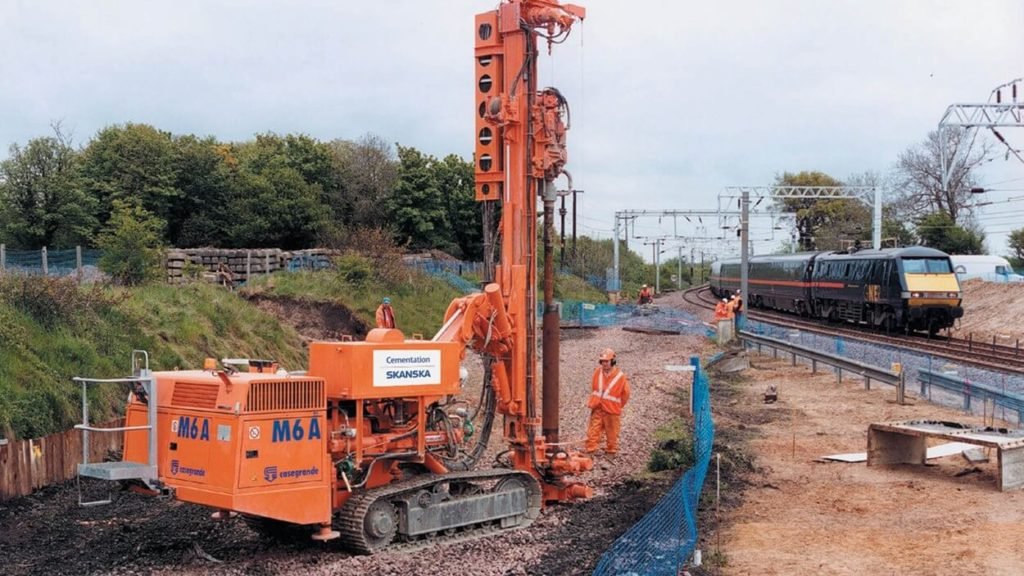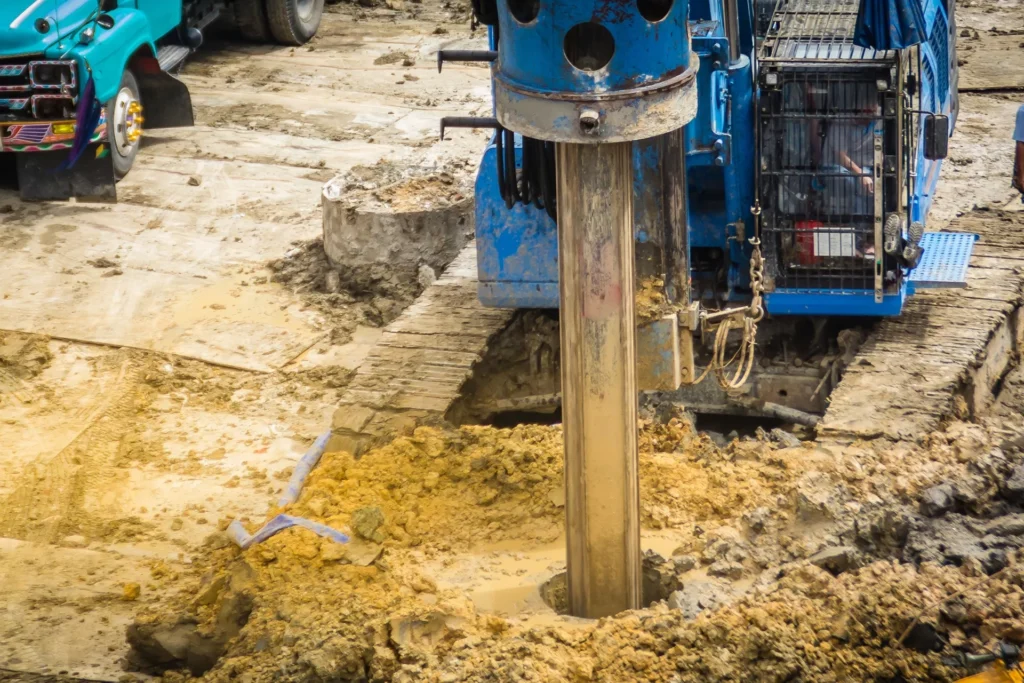As urban landscapes become more congested and the demand for sustainable building practices increases, the traditional piling methods are falling short of providing the required sustainability, especially in the UK where space constraints and complex ground conditions are common. Therefore, construction industries are greatly turning to mini piling in London and all around the UK to ensure optimal building sustainability and longevity.
Mini piling is an innovative construction technique that offers a versatile and effective alternative to traditional foundation solutions. In this process, smaller diameter piles (typically less than 300mm) are used to transfer the load of a structure to deeper, more stable soil or rock layers. It is ideal for sites with restricted access, low headroom, or challenging ground conditions.
To better understand the importance of mini or micro piling, you can explore its major applications and benefits here;
Applications of Mini Piling
Mini piling is a highly versatile solution that can help constructors create strong foundations for various types of buildings. Here are some of its major applications;
Restricted Access Sites
Mini piling is an ideal foundation solution for areas, where space is limited and conventional large-scale equipment cannot be easily maneuvered. These sites pose challenges for traditional piling and foundation techniques due to physical constraints.
Some common examples of restricted access sites where mini-piling can help you build large, sustainable buildings are listed below;
Urban Environments
Mini piling is particularly useful in densely populated urban areas where space is limited and maneuvering large machinery is impractical. It allows for the construction of foundations in tight spaces without compromising on stability or safety.
Basements and Underpinning
When adding basements to existing structures or underpinning old foundations, mini-piling provides a robust solution that can be executed with minimal disruption to the surrounding environment.
Challenging Ground Conditions
Mini milling also has wide applications in areas where soil and subsurface environments can complicate construction activities. Such soils require specialized techniques to ensure sustainability and compatibility.
Here are some common, challenging ground conditions where mini-piling can provide stable foundation bases:
Poor Soil Quality
In areas with weak or unstable soil, mini piles can penetrate to more stable strata, ensuring the structural integrity of the building.
Brownfield Sites
Redevelopment of contaminated or previously used industrial sites often requires specialized foundation techniques. Mini piling can address the complexities associated with these sites, including dealing with buried obstructions and variable ground conditions.
Specialized Construction Projects
Mini piling technique is also renowned for its wide applications in specialized construction projects Specialized construction projects require unique engineering solutions and advanced construction techniques to address specific challenges or meet particular requirements.
Let’s take a look at specialized construction projects here;
Infrastructure Projects
Bridges, railways, and other infrastructure developments often require deep foundations in difficult-to-access locations. Mini piling provides a flexible solution for these demanding applications.
Renewable Energy Installations
The foundations for wind turbines and solar panel installations can benefit from mini piling, particularly in remote or environmentally sensitive areas.

Benefits of Mini Piling
As we already mentioned, mini piling is an innovative, more effective, and cost-saving alternative to traditional foundation or piling solutions. It not only provides a strong foundation base for your building but also brings various other benefits that are listed below;
Versatility
Mini piling can be adapted to a wide range of soil conditions and site constraints. Its ability to be installed in confined spaces makes it suitable for both new constructions and the renovation of existing structures.
Reduced Environmental Impact
The installation process for mini piles typically generates less noise and vibration compared to traditional piling methods. This is particularly advantageous in urban settings where minimizing disturbance to surrounding buildings and residents is crucial.
Cost-Effectiveness
Due to their smaller size and the use of less material, mini piles can be a more economical option for foundation construction. Additionally, the speed of installation can result in lower labour costs and faster project completion times.
Structural Integrity
Despite their smaller diameter, mini piles can provide substantial load-bearing capacity. When properly designed and installed, they offer a reliable foundation solution that can withstand significant structural loads.
Flexibility in Design
Mini piling systems can be tailored to meet specific project requirements, allowing for customized solutions that address unique site challenges. This flexibility extends to the choice of materials, installation methods, and pile configurations.
A Final Word
In today’s fast-paced construction landscape, the role and importance of adaptable and efficient foundation solutions like Mini piling in Manchester cannot be overstated. It has emerged as a critical technique to create strong and reliable foundations in areas where space constraints and complex ground conditions are prevalent. From urban redevelopment projects to specialized infrastructure installations, it has wide applications and also offers a myriad of potential benefits. Therefore, it is considered a more reliable foundation solution for both new construction and renovation projects.





Играю в онлайн-казино уже много лет, перепробовал десятки площадок, но редко встречал такое качество, как у официального сайта Vodka Casino. С первой минуты ощущается серьёзный подход: никаких глюков, интерфейс логичный, бонусы начисляются без лишних условий. Установил мобильную версию и полностью перешёл с компьютера. Особенно круто, что нет проблем с доступом — зеркало работает даже тогда, когда блокируют другие платформы. Заработал на слотах за неделю больше, чем обычно за месяц. Это не просто везение, а реальный шанс на стабильный профит.
how much hgh to take a day for bodybuilding
References:
hgh anti aging dosage (http://srv29897.ht-test.ru)
dianabol cycles
References:
testosterone and dianabol cycle (https://motionentrance.edu.np/profile/bowlpine38/)
dianabol and deca cycle (md.swk-web.com)
test and dianabol cycle
References:
dianabol cycle before and after, srv29897.ht-test.ru,
dianabol test cycle
References:
dianabol post cycle therapy
hgh before and after bodybuilding
References:
Genfx hgh releaser
plant based steroids
References:
Body Building Dangers (Git.Expye.Com)
cjc 1295 w ipamorelin
References:
gh cjc 1295 no Dac and ipamorelin are decent
pharmacy ipamorelin
References:
cjc-1295 Ipamorelin igf-1 Increase study, Amigomanpower.Com,
shelf life of ipamorelin
References:
Ipamorelin and growth hormone releasing peptide 2
ipamorelin farmaco
References:
tesamorelin and ipamorelin blend dosage
ipamorelin acetate refrigeration
References:
sermorelin + ipamorelin blend for sale (http://www.annunciogratis.net)
ipamorelin the great work
References:
ipamorelin iron ddragon
best peptides for muscle building: ipamorelin
References:
can ipamorelin make you gain weight
how does winstrol work
References:
Androgenic definition (https://git.Eisenwiener.Com/kathibold77431)
alpha cuts advanced cutting agent
References:
what is anabolic Mean (Git.tea-assets.com)
injectable anabolic steroids
References:
gear bodybuilding (pierresderiviere.com)
steroid message boards
References:
https://www.generation-n.at/